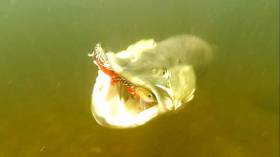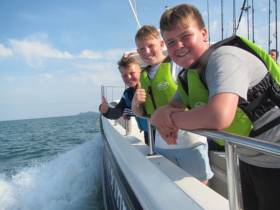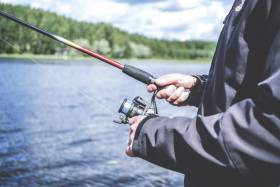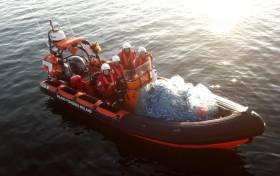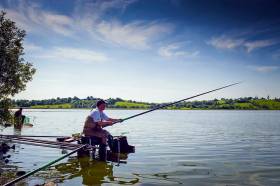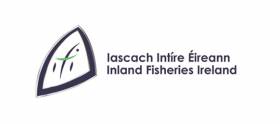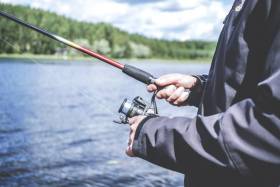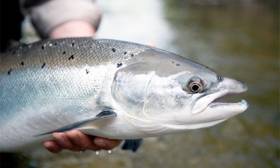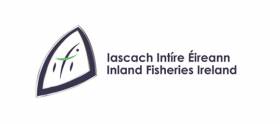Displaying items by tag: Inland Fisheries Ireland
New Angling Bye-Laws For Corrib Catchment In Galway & Mayo
#Angling - Seán Kyne, Minister of State with responsibility for the inland fisheries sector, has signed off three new angling bye-laws which affect the Corrib catchment in Galway and Mayo.
The bye-laws, which have been requested by local angling clubs, concern the Abbert and Grange Rivers, the Clare River and the Cong River and Canal, and reflect the support of the clubs for the conservation imperative and the sustainable management of the local fisheries resource.
The Abbert and Grange Rivers (Annual Close Season) Bye-Law extends the closed season for all angling on the Abbert and Grange Rivers by two months to cover the period from the 1st of September until the 31st of March annually.
This bye-law is being introduced at the request of the angling clubs on the Clare system and will act as a vital conservation measure.
Both rivers make a significant contribution to wild brown trout stocks in the Clare River system and Lough Corrib. The new bye-law will afford greater protection to spawning salmonids in these two very important tributaries of the Clare River.
The Western Fisheries Region River Clare (Revocation) Bye-Law permits all legal angling methods on the Clare River from Daly’s Bridge in the townland of Corrandrum to a point 300 metres upstream of the footbridge at Anbally in the townlands of Anbally and Turloughmartin, Co Galway.
This section of river was previously restricted to fly fishing only. However, this new bye-law will bring this short section of the river into line with the rest of the Clare River. This bye-law was introduced at the request of the local angling club.
The Upper and Lower Limits of Cong River and Cong Canal Bye-Law clearly defines the upstream boundary between Lough Mask and the Cong Canal and the downstream boundary between the Cong River and Lough Corrib.
The purpose of the bye-law is to enable the effective enforcement of legislation governing the open angling seasons for trout and salmon on the Cong Canal/River as these differ from the open seasons for these species on Loughs Corrib and Mask.
This bye-law will also remove any difficulty in identifying the correct angling season at the extremities of the Cong River/Canal and will afford greater protection to highly prized ferox trout which are known to spawn in the Cong River/Canal.
“We welcome the introduction of these bye-laws in Galway and Mayo which will help us to enforce relevant legislation and enhance the resource in the long term,” said Inland Fisheries Ireland chief executive Dr Ciaran Byrne.
“The introductions of these bye-laws follow public consultations whereby stakeholders were invited to input their views and insights into the proposed new regulations. Inland Fisheries Ireland’s fisheries officers will now protect these rivers in line with the new laws in place.”
Anglers are requested to familiarise themselves with the details of the new bye-laws, which can be found on the website of the Department of Communications, Climate Action & Environment.
Pike In Irish Waters Have Changed Their Diet, New Research Indicates
#Angling - Pike in Irish waters may have changed their diet preferences, according to a new report launched this week by Inland Fisheries Ireland.
The report looks at new research carried out in 2016 on Lough Conn in Co Mayo and Lough Derravaragh in Co Westmeath and provides an insight into the dietary habits of pike.
Previous dietary research carried out in the 1960s and 1970s in Lough Derravaragh and Lough Sheelin (located across Westmeath, Meath and Cavan) indicated that pike preferred to eat brown trout and perch.
However, this latest research reveals that pike appear to have changed their prey preference and now predominately eat roach.
Researchers in Scotland and England have also found similar changes in pike diet occurring in Scotland (at Loch Lomond) and England (at Lake Windermere). It is thought the changes in diet are due to the invasion of roach in these waters.
The research examines whether pike and brown trout can co-exist in the same habitat. Using statistical models, it found that the species could live together within relatively large deep lakes with strong stream connectivity. However, in small, low-complex systems, pike introductions could potentially have a devastating impact on resident brown trout populations.
The practice of pike removal and the impact it has on brown trout stocks is also examined. The findings suggest that pike removal may only be effective in protecting brown trout populations in systems where trout are the only available prey, but may have little effect in systems where other prey, such as roach, is available.
“This research was initiated to answer some ongoing questions relating to the dietary preference of pike and the pike-brown trout interactions in lakes across Ireland,” said IFI chief executive Dr Ciaran Byrne. “Previous studies in this area were carried out more than 50 years ago which is a long time within our changing lake systems.
“This research is important as it gives an insight into the behaviour of the pike species and provides updated information around their relationship with brown trout. The changing food web and altered preferences of predators in the water systems highlights the need for continued monitoring and updated data to inform effective management strategies.
“This research will now be considered alongside the many historic, socio-economic and management factors which all inform fisheries management and development work. Inland Fisheries Ireland uses the best available scientific information to underpin management decision making and advice.”
For further information visit www.fisheriesireland.ie/pikeresearch.
#Angling - Inland Fisheries Ireland (IFI) is calling on youth clubs, community groups and schools in the Greater Dublin Area to take part in its Dublin Angling Initiative.
The fishing programme aims to promote, develop and improve angling among children and young people in the city and surrounds.
Last year, more than 420 children and young people took part in the programme which caters for anyone interested in angling, from the complete novice to the more advanced angler, with exposure given to each of the different types of fishing.
The initiative offers children and young people an opportunity to take fishing lessons, participate in fishing trips and enjoy family fishing days.
In addition to practical fishing exercises, presentations and tours provide an insight into fish, their habitat, conservation measures and education regarding local fishing areas.
IFI’s Dublin Angling Initiative has seen thousands of young people participate over the past 20 years, resulting in the establishment of many new fishing clubs.
Brian Beckett, IFI director of the Eastern River Basin District, said: “We are calling on youth clubs, community groups as well as national and secondary schools who would like to try out a new hobby this summer.
“Fishing is a pastime which can be enjoyed at any age or ability. The Dublin Angling initiative introduces young people to the pursuit, giving access to fishing equipment, guidance around how and where to fish and building awareness around the importance of protecting and conserving our fisheries resource and the broader aquatic environment.”
Some availability remains for angling activities in August, September and October, and IFI invites any groups who are interested to get in touch without delay as places are limited. Interested groups should contact Rory Keatinge, co-ordinator of the Dublin Angling Initiative, at [email protected] or 087 614 2906.
Dormant Accounts Funding To Develop Youth Angling
#Angling - Inland Fisheries Ireland (IFI) has been awarded funding to develop angling among young people as part of the Dormant Account Action Plan 2018.
“Inland Fisheries Ireland was chosen as a recipient of two funding measures which will engage and support young and novice anglers in Ireland,” said Seán Kyne, Minister of State for Rural Affairs and Natural Resources, announcing the funding yesterday (Thursday 19 July).
“The funding will see the development of a new novice angling strategy, a scheme to support angling events for novice and youth anglers and the appointment of five Regional Outreach Co-ordinators”.
Novice Angling Strategy (€70,000)
This measure will see the development of a Novice/Youth Angling Strategy and a scheme to support events for disadvantaged groups, angling hubs and coaches to ensure a safe environment for youths and vulnerable adults. IFI will continue to support Angling for Youth Development Ireland (AFYDI) and the Angling Council of Ireland (ACI) who facilitate the formation of angling hubs nationally to increase access to angling through the provision of trained coaches and safe fishing.
Go Fishing - Novice Angling Initiative (€323,250)
This project will see the appointment of five regional Outreach Coordinators in the major urban areas who will work with Angling for Youth Development Ireland, the Angling Council of Ireland and other angling organisations to increase the numbers engaging in angling across the regions.
The Dormant Account Action Plan allocates €40 million in funding to 45 measures nationwide. Its funding supplements the support already allocated by IFI to youth angling via the National Strategy for Angling Development (NSAD). These five appointments, together with NSAD supported posts, will deliver national education and outreach and novice angling briefs.
The funding will also allow IFI to properly resource a novice angling strategy which will incorporate one of its existing youth angling programmes, the Dublin Angling Initiative, and the many other education and outreach initiatives which are taking place across the country. It will also reach out to and include angling and voluntary organisations nationwide.
“We are delighted to welcome this funding, which will support us in growing the numbers of novice and youth anglers in Ireland,” said IFI chief executive Dr Ciaran Byrne. “Recent socio-economic studies of recreational angling in Ireland reveal that of the 325,000 anglers in Ireland, 37% are over 55 years of age and 49% are in the 35-54 age bracket. We know however that 83% of primary school students we surveyed want to go fishing.
“There is a huge opportunity for us to engage the next generation around our natural fisheries resource and to introduce them to angling, a pastime they can enjoy at any age or ability with many health and wellbeing benefits. The Dormant Account funding will help us realise our ambitious objectives of growing participation in fishing nationally and secure the future of our resource as a result.
“We look forward to working closely with angling groups and communities across Ireland in the development of a new Youth Angling Strategy and the roll out of related novice angling initiatives.”
Illegal Salmon Netting in Donegal, Inland Fisheries Ireland Identifies 'Two Significant Cases'
Inland Fisheries Ireland has seized 26 untagged salmon in The Glenties area in Donegal and 1,100 yards of illegal salmon drift nets off Inishbeg Island. The seizures were secured last week by Inland Fisheries Ireland’s Fisheries Officers who are based in Donegal.
The first seizure took place following covert surveillance by Fisheries Officers which resulted in 26 untagged salmon being identified. The second seizure occurred at Inisbeg Island later the same day while Fisheries Officers were conducting sea patrols along the North West coast of Donegal. Two drift nets, measuring 600 yards and 500 yards respectively, were located drifting east of Inishbeg Island and were seized together with two salmon.
The Fisheries Officers were utilising the first of a new fleet of 7.8 Delta RIB boats recently commissioned by Inland Fisheries Ireland and officially launched by the Minister of State for Inland Fisheries, Sean Kyne and Joe McHugh TD, Minister with responsibility for Gaeilge, Gaeltacht and the Islands in Rathmullan, Co. Donegal last month.
Dr Milton Matthews, Inland Fisheries Ireland Director of the North West River Basin said: “Both incidents highlight the importance of ongoing Inland Fisheries Ireland offshore and coastal patrols to protect migrating salmon and sea trout stocks against illegal fishing activity at a time when salmon stocks are under severe pressure from high temperatures, very low water levels and a long term decline in survival rates at sea.
The value of prompt and accurate information from concerned members of the public who report instances of suspected illegal activity or pollution alerts cannot be overstated. Information may be passed directly to local Inland Fisheries Ireland staff or by phoning our confidential Hotline number on 1890 34 74 24 or 1890 FISH 24.”
#Angling - Inland Fisheries Ireland (IFI) is appealing to anglers and fishery managers to voluntarily cease salmon angling on catch-and-release rivers with immediate effect due to high water temperatures and the current drought conditions.
The agency also advises that for conservation purposes on open rivers, anglers should cease angling once their daily bag limit is reached.
With regard to keep nets on coarse fisheries, IFI advises that this practise should be suspended at this time.
IFI says it will monitor the situation and issue updates as appropriate. Should the current weather conditions continue, the agency may consider the introduction of emergency conservation legislation.
Inland Fisheries Ireland & OPW Commit To Five-Year Working Agreement On Flood Risk Management
#Angling - Inland Fisheries Ireland (IFI) and the Office of Public Works (OPW) Flood Risk Management Unit have signed a new shared service agreement which will see them continue collaborate over the next five years in the protection of fishery requirements while carrying out flood risk management activities.
The agreement will see both parties work closely together to help ensure the country’s statutory drainage objectives are achieved, with a focus on the protection of fishery habitats and resources.
The OPW is the lead statutory body for drainage maintenance and flood risk management (FRM) in the State, while IFI is the statutory body responsible for the protection and conservation of the inland fisheries resource.
The agreement, which spans from 2018 until 2022, has been secured at a time when Government investment in flood risk management operations is increasing.
It follows the recent publication of the Government’s Flood Risk Management Plans which will see some €1 billion in funding under the National Development Plan invested in projects across the country to mitigate flood risk.
This new partnership formalises the historical working relationship between the IFI and the OPW and commits them to continuing their positive engagement for Ireland’s fishery habitats and resources.
Under the agreement, both parties will work across the Environmental River Enhancement Programme (EREP) and will focus on:
A series of scientific investigations to further understand environmental impacts of river maintenance works.
Development of best practice to minimise environmental impacts and maximise environmental gain of river maintenance and flood relief activities.
Work programmes to identify barriers to fish passage on arterially drained rivers that have potential for improvements works.
Work elements to assist achieving so that all waters will attain ‘Good’ ecological status by a specified date, as per the Water Framework Directive.
The aim is to provide a science-based platform to the IFI-OPW links. For example, scientific investigations will provide an evidence base for determining the appropriateness or otherwise of undertaking physical river enhancement works in locations to bring about improved Ecological Quality Ratio (EQR) scores.
Facilitated by IFI surveys, an EQR will be generated for the fish community and the physical form of the river at each site. This will inform all requests to OPW from third parties, such as angling clubs or community groups, to undertake such works. IFI will be taking a prioritised approach in undertaking surveys and could handle a small number of cases annually.
“We are delighted to re-engage with the OPW and continue to foster the high levels of understanding of fishery requirements within flood risk management activities while also ensuring statutory drainage objectives are realised. Together, we will secure the future of our rich natural fisheries resource,” said Suzanne Campion, IFI’s head of business development.
John Curtin, director of engineering services with the OPW, added: “This agreement is a proactive one in terms of delivering environmental gain, while still balancing the drainage/flood relief functions for our communities and demonstrates how two public authorities working in partnership can achieve more that the organisations could working individually.”
73 Angling Initiatives Nationwide To Receive Funding
#Angling - Inland Fisheries Ireland yesterday (Thursday 21 June) announced the beneficiaries of its 2018 Sponsorship Programme, which supports angling events and initiatives across the country.
The scheme will financially support 63 events to be held in Ireland, and a further 10 juvenile and women’s events to be held overseas, to the overall tune of €30,000 — with a focus on those which help grow Ireland’s angling tourism product and support novice anglers.
A number of other events around the country will receive assistance from IFI staff during the year, along with promotional support and the use of IFI biosecurity equipment to prevent the spread of invasive species.
This year, Inland Fisheries Ireland’s Sponsorship Programme will support:
- 19 international angling events which will be held in Ireland.
- 10 Irish angling teams travelling overseas to international angling events.
- 28 coaching/juvenile events/competitions aimed at novice and young anglers.
- 14 national and local angling events held in Ireland for domestic participants.
- 2 seminars which will help the exchange of information, ideas and practical experiences on fisheries management.
The angling initiatives, spanning 22 counties, will be supported through financial aid and, where possible, through resource support from Inland Fisheries Ireland staff members.
This year’s IFI Sponsorship Programme was announced in January with applications invited from anglers, angling clubs and organisations nationwide. In total, there were over 100 applications to the 2018 programme.
IFI’s head of business development Suzanne Campion said: “With Ireland having some of the best wild fisheries in Europe, this annual Sponsorship Programme forms part of our National Strategy for Angling Development, which aims to develop our angling tourism potential, while also managing and conserving our fisheries resource.
“Tourism initiatives like the Wild Atlantic Way and Ireland’s Ancient East are further boosting visitor numbers and our Sponsorship Programme for 2018 will support angling clubs and groups nationwide to offer local events which engage domestic anglers, overseas anglers and those who are about to cast for the first time.”
Recreational angling is estimated to contribute over €800 million to Ireland’s economy on an annual basis, supporting upwards of 11,000 jobs.
According to IFI, angling offers rural communities the opportunity to increase the number of visitors to the area and, in turn, support local business and create jobs by providing a sustainable source of income for both catering and accommodation services.
IFI 2018 Sponsorship Programme Beneficiaries List
Cavan
- Cootehill IFI Fishing Festival: five-day coarse fishing festival at Cootehill, organised by Cootehill Fishing Festival.
- Arvagh Breffni Seniors event: angling competition at Arvagh lakes over five days, organised by Arvagh Angling Holidays
- Arvagh International Coarse Fishing Festival: angling competition at Arvagh lakes, organised by Arvagh Angling Holidays.
- Arvagh King of Clubs: angling competition at Arvagh lakes, organised by Arvagh Angling Holidays.
- Arvagh Breffni Open: angling competition at Arvagh lakes, Arvagh Angling Holidays.
- Romanian Catch and Release Angling Association’s lure fishing competition at Lough Ramor, organised by the Romanian C&R Angling Association.
- Feeder fishing three-day event: Barnagrove Lake and Lough Sillan, organised by C/M Lakelands Feeder Club.
- Building Angling Tourism Potential in Leitrim & Cavan: workshop format event at Slieve Russell Hotel, Ballyconnell, organised by Upper Shannon Erne Future Economy Project.
Cavan/Leitrim - World Pairs Angling Championships: Shannon-Erne region, organised by World Pairs Angling.
- All Ireland Championships Senior & Ladies: Shannon Erne and various locations in counties Cavan and Leitrim, organised by the National Coarse Fishing Federation of Ireland, celebrating 60th anniversary.
Clare
- International Angling Week 2018: shore angling competition, Fanore, organised by Lisdoonvarna Fanore Sea Angling Club.
- Predator Battle Ireland: European angling competition, Lough Derg, Clare/Tipperary/Galway/Limerick, organised by Predator Battle Ireland.
- Trout Angling Competition: iuvenile angling competition, Lough Derg, Clare/Tipperary/Galway/Limerick, organised by Molamphy.
Cork
- Cork Small Boats Festival 2018: bring-your-own-boat sea angling festival, Cork Harbour area, organised by Cork Small Boats Festival Committee.
- SALC - Home Nations Boat (Seniors) 2018: boat sea-angling competition, Cobh, organised by Irish Federation of Sea Anglers.
- Defence Forces Sea Angling: boat competition, Crosshaven, organised by DFSAC.
- Tibbotstown Reservoir Initial Stocking: stocking of brown trout, reservoir, organised by Glanmire & District Salmon & Trout Anglers Association.
- Introduction to Game Angling Course: Tibbotstown Reservoir, Carrigtwohill, organised by Glanmire & District Salmon & Trout Anglers Association.
- Introduction to Angling: eight-week introductory course on angling, River Bride, Rathcormac, organised by Rathcormac Angling Hub.
- Fly-tying for beginners: eight-week fly-tying course, Rathcormac Community Centre, organised by Rathcormac Angling Hub.
- Introduction to Invertebrates and Entomology: three-week course, River Bride, Rathcormac, organised by Rathcormac Angling Hub.
Dublin
- Weekly Educational Workshops: on a weekly basis KAI hosts an hour-long workshop to help introduce youths to angling, Killinarden Community Centre, organised by Killinarden Angling Initiative (KAI).
- Monthly youth angling field trips: once a month (the last Saturday) KAI brings 20 youths on an angling trip to put into practice what they have been learning in the weekly workshops, various locations/counties (canals, lakes, rivers and beach), organised by Killinarden Angling Initiative.
Galway
- Police International Fly Fishing/Home Nations Competition: three-day trout fly fishing competition between the police forces of Ireland, Northern Ireland, England, Scotland and Wales, Lough Corrib, Green Fields Bay, organised by Garda Trout and Salmon Anglers Club.
Kerry
- Tag-a-Ray: a competition that encourages anglers to become involved in tagging and to increase awareness of conservation, Tralee Bay, organised by Tralee Bay SAC.
Kildare
- TAFI youth training day: training for TAFI youth anglers in Leinster, River Slate, organised by Rathangan Trout and Salmon Anglers Association.
Kilkenny
- Annual Junior Fishing Competition: fishing competition for Under-14s, The Nore, organised by Kilkenny City and County Anglers.
Leitrim
- Ballinamore Coarse Angling Festival: five-day coarse angling festival, Shannon-Erne, organised by Lakelands Angling Ballinamore.
- All-Ireland Championships Senior & Ladies, National Coarse Angling Championships - 60th Anniversary, Shannon-Erne, Cavan/Leitrim, organised by National Coarse Fishing Federation of Ireland.
Limerick
- Glin Shannon river fishing: shore fishing on estuary, lay-by beyond Glin Pier, organised by Glin Development Association
Shannon, Mulkear and District Anglers Association - Catch and Release Salmon Angling competition, ‘The Haunt’, Mulcair River, organised by William O'Halloran.
Mayo
- Spring International Fly Fishing Match: international fly fishing competition comprising of teams from Ireland, England, Scotland and Wales, Lough Mask, Cushlough Bay, Ballinrobe, organised by Irish Trout Fly Fishing Association (ITFFA).
- Newport SAC 52nd Annual Sea Angling Festival: combined shore and boat angling competition, open to all anglers, Clew Bay, Co Mayo, organised by Newport Sea Angling Club.
- Junior-branch shore angling training: teaching the younger members of the club the joys of shore angling, various shore-based locations around Clew Bay, organised by Newport Sea Angling Club.
- National Junior Competition (Daniel Peacock Memorial): 26th Anniversary of a Juniors-only sea angling competition, Clew Bay, organised by Newport Sea Angling Club.
- RBM Fisheries Petals Cup Ladies Sea Angling Competition: ladies’ sea angling competition from novice to experienced, Clew Bay, organised by RBM Fisheries.
Meath
- Boyne Valley Fishing Hub: angling for beginners, River Boyne, Trim, organised by Boyne Valley Hub.
- Summer Youth Programme: series of coaching evening sessions targeting local youth, Royal Canal at Enfield, organised by Royal Enfield Coarse Angling Club.
Monaghan
- Junior Summer Camp 2018: introducing Juniors to the basics of angling and fish care, Lisanisk Lake, organised by Carrickmacross Coarse Angling & Junior Development Club.
Offaly
- Edenderry Coarse Angling Six-Day Gala Week, Grand Canal, Edenderry area, Edenderry Coarse Angling Club.
- The Daingean teams-of-four angling festival: four-person teams event with the aim of bringing teams to the Grand Canal in Offaly from across the world, Grand Canal, organised by Daingean Angling Club.
- Junior Anglers 2018: seven-week coarse angling for under-18s, Grand Canal, Tullamore, organised by Tullamore and District Angling Club.
- Angling Awareness Competition, Grand Canal, organised by Belmont and District Fishing Club.
Roscommon
- Fishbook Open Fly Competition: first-ever meeting of members for an all charitable catch and release, fly only for trout completion, Lough Key, organised by Fishbook Ireland.
- Cuisle Angling Event, River Suck, Donamon, organised by Cuisle Holiday Centre.
- Building Angling Tourism Potential in Roscommon & Longford: workshop part of a series, Keenan’s Hotel, Termonbarry, organised by Upper Shannon Erne Future Economy Project.
Waterford
- Disability outreach programme at Ballyshunnock, organised by St Paul’s Fishing Club.
- Rinnashark Sea Angling Club Small Boats Angling Festival: small boats species hunt angling competition, at Dunmore East, organised by Rinnashark SAC.
- Junior League: six coaching and competition sessions, Ballyshunnock, River Barrow, Oaklands, organised by Waterford and District Coarse Angling Club.
Westmeath
- Introduction to coarse angling for juniors: includes tuition session in the basics of coarse angling for Juniors, venue tbc, organised by Navan Coarse Angling Club.
- Lough Ree International Pike Classic: three-day predator competition featuring 100 boats and 50 international and international competitors, Lough Ree - launching at Ballyleague & Lanesborough, organised by Lough Ree Angling Hub.
- Lanesborough International Coarse Fishing Championships: three-day international fishing competition with competitors from UK, rest of Europe and Ireland, three different locations - this year, the Royal Canal for first time, includes Roscommon and Longford fisheries, organised by Lough Ree Angling Hub.
- Lough Ree International Pike Festival and World Cup: three days of pike fishing on the fabulous Lough Ree with 100 boats taking part from Ireland, Germany, Austria, Belgium, England and Northern Ireland, organised by Lough Ree International Pike Festival and World Cup (Athlone Anglers Association).
- Junior All Ireland Pike Fishing Championships: series of under-18s Pike fishing competitions, organised by Leinster Pike Angling Club.
Wexford
- 33rd Annual Rosslare Small Boats Festival: small boat angling species hunt, Kilmore Quay, organised by Small Boat Anglers of the UK & Ireland.
- Irish Winter Shore Angling Festival: three-day shore angling competition, Kilmuckridge, organised by European Federation of Sea Anglers.
- Dunbrody Festival: two-day coarse angling festival, organised by Oaklands Coarse Angling Club.
Wicklow
- Novice Angler Introduction to Boat Angling: practical boat angling with introduction/coaching, Wicklow Port, organised by Wicklow Bay Sea Angling Club.
- Youth Boat Angling Coaching: introduction and coaching for youth in boat angling, Wicklow Port & Kilmore Quay, organised Leinster Provincial Council.
- Angling Coaching – Shore: introduction and coaching for youth, venue TBC, organised by Leinster Provincial Council.
#Fishing - Sean Kyne TD, Minister with responsibility for the inland fisheries sector, today (Thursday 21 June) welcomed the positive outcome from the international discussions at the North Atlantic Salmon Conservation Organisation (NASCO) annual meeting in Portland, Maine, USA.
“Our departmental officials and those of Inland Fisheries Ireland represented Ireland at the negotiations as part of the EU delegation,” Minister Kyne said. “They joined delegates from the EU, USA, Canada, Norway, the Russian Federation, Greenland and the Faroes.
“The outcome of the week-long discussions is that, for the period 2019-2022, no harvest fishery will take place off the Faroe Islands and the restrictions on the fishery off West Greenland have been strengthened.
“I am pleased that these two important regulatory measures were agreed in a spirit of international c-ooperation.”
Minister Kyne emphasised the importance of these measures for Irish salmon migrating to distant feeding grounds before returning to their natal rivers in adulthood to spawn.
“The migratory stock complex travelling through Faroese waters comprises a majority component of European river stocks, including those from Ireland, and the measure to have no commercial fishing in these waters is important for these vulnerable stocks,” he said.
“I am particularly pleased that the discussions on the Faroes area were chaired by Ireland, on behalf of the EU.”
The majority component of the stock complex migrating to Greenlandic waters originates from the North American continent, and the restriction on fishing in this area assists these stocks as well as the smaller European component.
The agreed level of potential catch, for the internal use fishery in Greenland, is reduced by some 33% over the quota set in each of the last three years. Agreement was also reached on increased monitoring and control of the fishery.
The NASCO meeting also considered the factors that affect the marine survival of Atlantic salmon, with scientists, including those from IFI, engaged in cutting edge work to identify and address those causes.
Determining why salmon are dying at sea before they can come back to their natal rivers to spawn is a key research priority.
A new innovative approach to oceanic long range acoustic monitoring, ‘ROAM’ (RAFOS Ocean Acoustic Monitoring), will allow salmon to be tracked through the marine environment. The approach is intended to overcome many of the significant challenges associated with tracking Atlantic salmon throughout their extensive marine migration.
Minister Kyne concluded that the measures taken in Ireland, over a decade ago, to protect migratory salmon stocks have pointed the way internationally and the latest agreements at NASCO demonstrate restraints on exploiting Irish and other stocks as they migrate outside our waters.
#Angling - The Salmon Conservation and Midland Fisheries Funds are now open to projects for habitat restoration and conservation, as announced earlier this week by Sean Kyne TD, Minister of State with responsibility for inland fisheries.
The closing date for applications to these schemes, as part of Inland Fisheries Ireland’s (IFI) National Strategy for Angling Development, is Thursday 12 July.
The National Strategy for Angling Development aims to ensure that Ireland’s fish stocks and angling infrastructure are protected and enhanced with a view to ensuring a sustainable habitat and delivering the economic, health and recreational benefits they offer to communities across Ireland.
The Salmon Conservation Fund is generated from the sale of salmon and sea-trout licences and reinvested in projects that will assist in the conservation of salmon.
“As the Conservation Fund is financed via a portion of licence sales for both Salmon and Sea Trout, I asked IFI to develop a revised scheme that will include sea trout conservation projects and update the existing salmon-only scheme,” Minister Kyne said.
“As a first step to realising a full scheme for sea trout, this year’s fund is open to accepting a pilot sea trout project for the Waterville area.”
Applications to the Salmon Conservation and Midland Fisheries Funds must relate to conservation habitat improvement projects.
Applications may be made online and are invited for projects that are ‘ready to go’, ie that have all the necessary paperwork and permissions in place and can move to delivery following successful progression through evaluation and award stages. Such projects would include, for example, a second or subsequent phase of an existing scheme.
Successful applications must meet the requirements of the IFI Environmental Assessment process.
IFI’s current priority is to ensure projects already awarded funding under the recent National Strategy for Angling Development schemes up to and including 2017 are completed and project officers continue to assist applicants to bring these projects to delivery phase.
To this end, project officers are engaging with groups and other Government agencies. Ready-to-go projects should be timed to complete by end of September 2018.
Meanwhile, IFI has issued an appeal to farmers to remain vigilant during the summer months when harvesting silage and spreading slurry to avoid water pollution and the loss of nutrients into rivers, lakes and other watercourses.
The appeal comes on the back of last week’s major fish kill in Claremorris, where over 1,000 wild brown trout and other species died as a result of a suspected agricultural silage leak.
Silage operations will be ongoing all summer and silage effluent has the potential to cause devastating pollution in streams and rivers.
Such effluent is a significant polluting substance, starving fish and invertebrate life of oxygen, resulting in potentially massive fish kills if it enters a watercourse.
With some rivers low during summertime with little dilution capacity, the effect of a small leak can cause huge damage.
IFI is advising farmers to follow its simple six-point plan to ensure good farmyard management and reduce their risk of polluting:
- Use round bales as the most environmentally friendly way to store silage.
- If a silage pit is being used, ensure it is properly sealed to prevent leakage from under the slab.
- Carry out slurry spreading in dry weather and never when heavy rain is forecast.
- Never spread slurry close to a watercourse, be aware of the slope of land to the watercourse.
- Do not clean tanks beside any watercourse, stream or a river.
- Do not allow any effluent or washings to enter any rainwater gully.



























